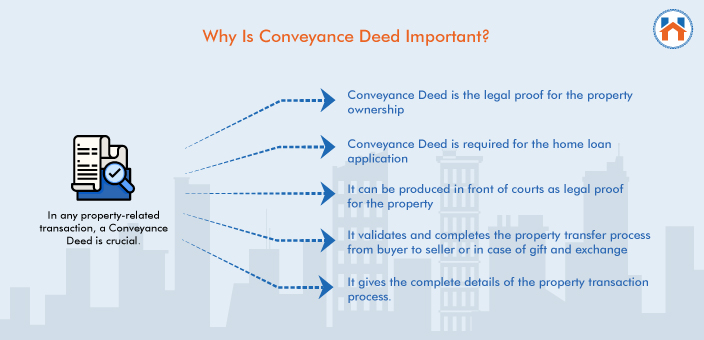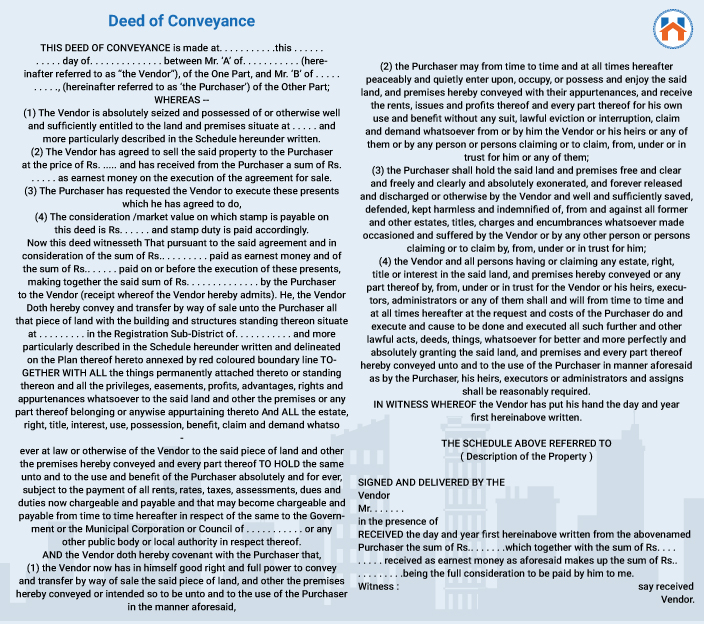A conveyance deed is the most important legal document for transferring the ownership of the property. Without the registration of the Conveyance deed, the property transaction is considered incomplete and remains legally unauthorized. This article gives you the detailed meaning of the Conveyance deed, its importance, and the sample Conveyance deed format.
Page Contents
- What Is Conveyance Deed?
- Understanding Conveyance Deed Meaning?
- Why Is Conveyance Deed Important?
- Difference Between Sales Deed And The Conveyance Deed
- Conveyance Deed For the Societies
- What Are The Types of the deed of conveyance?
- What’s Included in the Deed of Conveyance
- Important Documents Required For the Conveyance Deed
- Sample Conveyance Deed Format
- FAQs
What Is Conveyance Deed?
The conveyance deed is an important legal document for transferring the ownership of the property.
The conveyance deed is necessary for transferring the ownership of the property by sales, gifts, and exchanges.
Only after registering the conveyance deed at the sub-registrar office, the ownership of the property becomes legally valid.
You can register the conveyance deed by paying the applicable stamp duty and registration charges. There is also a provision to register the Conveyance deed online by paying the stamp duty and registration charges.
Understanding Conveyance Deed Meaning?

Let’s understand the meaning of the Conveyance deed, by analyzing both the terms separately.
In the real estate domain, Conveyance means transferring the ownership of the property. The transfer of the property can be selling, gifting, or exchanging the property to the other party.
Now, this conveyance or transferring the property from buyer to seller takes place through a specific instrument or deed.
The deed is the legal document that includes the terms and conditions involved in the property transfer transaction. The parties involved in the property right transfer need to sign the deed by duly reading the terms and conditions.
To put it is simply, the conveyance is the process of transferring the property. And the Deed is a legal document comprising of the terms and conditions of the property transfer.
Execution or the signing of the conveyance deed and registering it at the sub-registrar office, successfully transfers the ownership of the property.
Why Is Conveyance Deed Important?

In any property-related transaction, a Conveyance Deed is crucial.
- Conveyance Deed is the legal proof for the property ownership
- Conveyance Deed is required for the home loan application
- It can be produced in front of courts as legal proof for the property
- It validates and completes the property transfer process from buyer to seller or in case of gift and exchange
- It gives the complete details of the property transaction process.
Difference Between Sales Deed And The Conveyance Deed
Mostly, the terms conveyance deeds and sales deeds are used for the property transaction.
However, there is a difference between the Sales Deed and the Conveyance Deed.
| Conveyance Deed | Sales Deed |
| A conveyance deed is a legal document for transferring the property from one part to the other. The conveyance could be for the property sale, gifting or exchange. | A sales deed is a type of Conveyance Deed used for selling the property from one party to the other. |
| The Conveyance deed may or may not be given complete ownership to the property buyer. | Sales deed gives complete ownership of the property to the buyer. |
| In Conveyance Deed, the property buyer has the right to use the property, but may or may not have the right to sell it. | In the Sales Deed, the property buyer or the owner has the right to use and re-sale the property. |
| In the case of the Conveyance Deed, the property ownership is transferred completely or for a certain period of time. | In the case of a sales deed, the |
| Stamp Duty and Registration charges may or may not be applicable on the Conveyance Deed registration. It depends on o the | Stamp Duty and Registration charges are applicable and mandatory for registering the sales deed. |
Conveyance Deed For the Societies
The developer owns the land or the plot of the real estate project. After the construction of the project, the developer sells the apartments to the property buyers.
While selling the property, the developer and the property buyer executes the Sales deed, which gives the property rights on the constructed part, and the ownership of the land still remains with the developer.
To give complete ownership of the land, the developer and the society should execute the conveyance deed.
What Are The Types of the deed of conveyance?
The deed of conveyance can be classified as follows-
- Conveyance Deed On Freehold Property
The conveyance deed on the freehold property gives the complete ownership rights to the property buyer.
- Conveyance Deed On Leasehold Property
The Conveyance Deed on the leasehold property means that the property owner has the right only to the construction and not on the land.
- Gift Deed
The Conveyance deed can also be done for the property that is gifted from one part to the owner.
What’s Included in the Deed of Conveyance
The deed of the conveyance has the following things-
- The details of the parties involved
- Property related details and specifications
- Power of attorney if applicable
- Complete definition and details on the boundary of the property
- All the legal property rights to the owner
- All the Important terms and conditions related to the property ownership
- Tenure of the property ownership
- Names and signatures of the witnesses
Important Documents Required For the Conveyance Deed
Following are the important documents required for the Conveyance Deed.
- Sales Agreement
- Approved Property Plot Layout
- Certificate of Commencement
- Certificate of Completion
- Certificate of Occupancy
- Stamp Duty Payment Receipt
- Registration Receipts
- Building structure
- Entries of the mutation
Sample Conveyance Deed Format
Though the conveyance deed format varies depending on the different set of property-related conditions, the main framework remains the same.
Here is the sample conveyance deed format.

FAQs
| What Is Conveyance Deed?
A conveyance deed is an important document for transferring the ownership of the property. Registration of the conveyance deed legally validates the transfer of the property. |
| Why Is Conveyance Deed important?
The Conveyance deed is important as it indicates the ownership of the property and can be produced as legal proof in case of disputes. |
| What Are The Types of the Conveyance Deed?
The conveyance deed can be classified based on the nature of the ownership to be transferred. Conveyance Deed can be done for the freehold property, leasehold property, subject to a mortgage, or a gift deed. |
| What is the difference between Conveyance Deed and the Sales Deed?
A sales deed is the type of Conveyance deed which is prepared ad executed while selling the property. The sales deed gives complete ownership to the property buyer. |
| How to register the conveyance deed on the property buying?
You can register the conveyance deed on the property at the sub-registrar office by paying the applicable stamp duty and the registration charges. |








